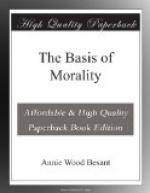* * * * *
V
MYSTICISM
Mysticism cannot be spoken of as a basis of morality in the sense in which Revelation, Intuition, Utility and Evolution are bases, for it is valid only for the individual, not for everybody, for the true Mystic, the dictates of the Outer or Inner God are imperial, compelling, but to any one else they are entirely unauthoritative. None the less, as the influence of the Mystic is wide-reaching, and his dicta are accepted by many as a trustworthy revelation—are not all revelations communicated by Mystics?—or as the intuition of an illuminated conscience, or as showing the highest utility, or as the result of an evolution higher than the normal, it is worth while to consider their value.
Mysticism is the realisation of God, of the Universal Self. It is attained either as a realisation of God outside the Mystic, or within himself. In the first case, it is usually reached from within a religion, by exceptionally intense love and devotion, accompanied by purity of life, for only “the pure in heart shall see God”. The external means are prayer to and meditation on the Object of devotion—Shr[=i] R[=a]ma, Shr[=i] K[r.][s.]h[n.]a, the Lord Jesus—long continued and persevering, and the devotee realises his Divinity by ecstacy attaining Union thereby. Such Mystics are, for the most part, valuable to the world as creating an atmosphere of spirituality, which raises the general level of religious feeling in those who come within its area; India has especially profited by the considerable number of such Mystics found within its borders in past times, and to a lesser extent to-day; every one who practises, for instance, meditation, knows that it is easier here than elsewhere, and all sensitive persons feel the Indian “atmosphere”. Outside this, such Mystics occasionally write valuable books, containing high ideals of the spiritual life. As a rule, they do not concern themselves with the affairs of the outer world, which they regard as unimportant. Their cry continually is that the world is evil, and they call on men to leave it, not to improve it. To them God and the world are in opposition, “the world, the flesh, and the devil” are the three great enemies of the spiritual life. In the West, this is almost universal, for in the Roman Catholic




